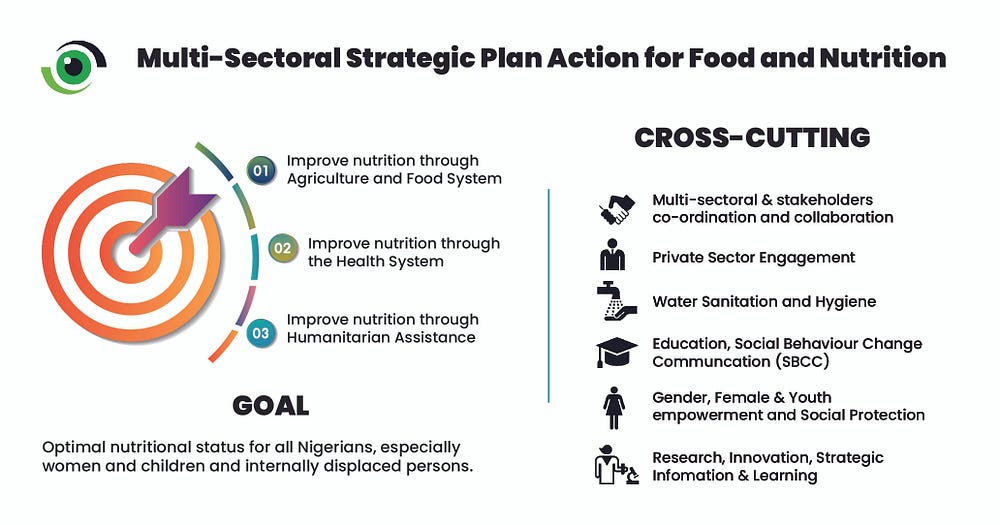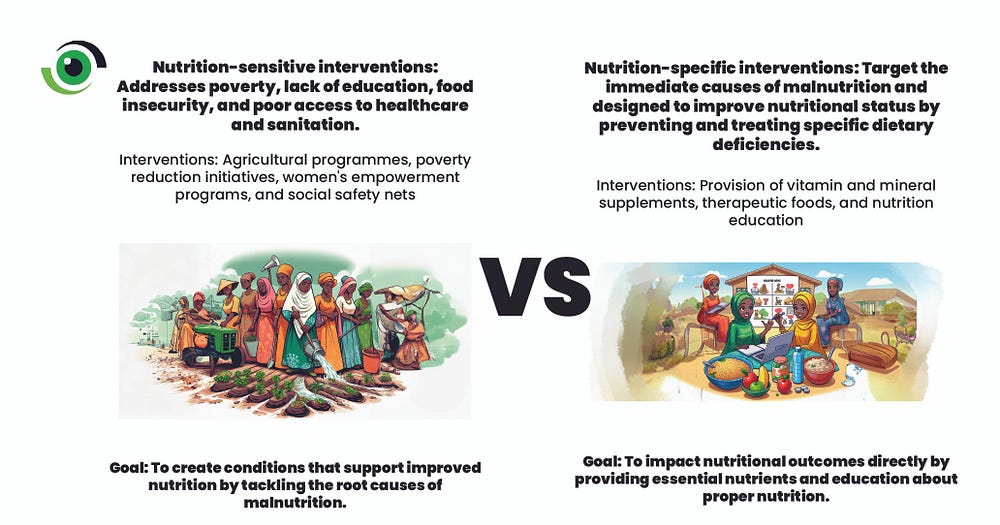By Safiya Shuaibu Isa
According to the National Policy on Food and Nutrition (NPFN 2016), effective institutional coordination is required to ensure Nigeria’s nutrition programme is result-oriented. Prior to its establishment in 2016, efforts to tackle malnutrition had been principally sectoral, with health, agriculture, education, science, and technology, among others, providing interventions independently.
The NPFN 2016 established a framework to guide the implementation of nutrition activities and designated the Ministry of Budget and National Planning as the focal point for the country’s food and nutrition policy programme, planning and coordination.
The enabling environment for nutrition in Nigeria
A study that examined Nigeria’s nutrition-enabling environment revealed that there is no dearth of knowledge on actions required to address malnutrition, however, ‘knowledge gaps remain about how to implement these actions in contextually appropriate ways, and at scales commensurate with the magnitude of the problem’.
Admittedly, there are numerous policies and guidelines in existence on improving nutrition outcomes in the country that confirm this statement including the National Multi-Sectoral Plan of Action for Food And Nutrition (NMPFAN) 2021–2025, the National Policy on Food and Nutrition (2016), the Agricultural Sector Food Security and Nutrition Policy 2016–2025, National Policy & Strategy for Maternal, Infant and Young Child Nutrition; Guidelines on Micronutrient Deficiency Control in Nigeria.
In an interview with the Federal Ministry of Health and Social Welfare, Ladidi Kulluwa Bako-Aiyegbusi mni, Director of Nutrition revealed that at the national level, the National Council on Nutrition (NCN), chaired by the Vice President of the Federal Republic of Nigeria, is responsible for making decisions on nutrition programmes in the country.
In 2021, the NCN launched and implemented the National Multisectoral Plan of Action for Food and Nutrition to guide the implementation of policies and programmes to combat hunger and malnutrition across all sectors in Nigeria.

This multisectoral approach recognises that the causes of malnutrition are multifaceted and require solutions that cut across sectors. The approved plan is expected to reduce the proportion of people who suffer malnutrition in Nigeria by 50% while increasing exclusive breastfeeding to 65%. It will also reduce the stunting rate in children under the age of five to 18% by 2025 by scaling up prioritised high-impact nutrition-specific and nutrition-sensitive interventions.
Deploying a complementary approach
Nigeria’s considerable nutrition challenge is divided into three categories; undernutrition, micronutrient deficiency and overnutrition — the overweight and obesity problem. Stunting on the other hand is an indication of chronic undernutrition. In Nigeria, nearly two out of every five (37%) children under the age of five are stunted or short for their age. NMPFAN advises implementing the whole package of nutrition-specific and nutrition-sensitive treatments in states where the incidence of stunting exceeds 40% and severe stunting is 20%.
Nutrition-sensitive and nutrition-specific interventions are complementary approaches to reducing malnutrition and improving overall nutritional outcomes. Nutrition-sensitive interventions address the root causes of malnutrition, including poverty, a lack of education, food insecurity, and poor access to healthcare and sanitation. Nutrition-sensitive interventions include agricultural programmes, poverty reduction initiatives, women’s empowerment programmes, and social safety nets. They indirectly contribute to improving nutrition by addressing broader factors that impact food security and dietary choices. The primary objective is to establish conditions that support better nutrition, by addressing the underlying causes of malnutrition.

Nutrition-specific interventions on the other hand, directly target the immediate causes of malnutrition. They are intended to improve nutritional status by preventing and treating specific dietary deficiencies. Programmes that provide vitamin and mineral supplements, therapeutic foods, and nutrition education specifically aimed at improving dietary practices and nutritional intake, fall under nutrition-specific interventions. The main purpose of nutrition-specific interventions is to directly influence nutritional outcomes by providing essential nutrients and teaching about proper nutrition.
Strengthening nutrition intervention approaches
The Accelerating Nutrition Results in Nigeria (ANRiN) project is a state-led World Bank-funded programme being implemented in 12 high malnutrition burden states ( Abia, Akwa Ibom, Gombe, Kaduna, Kano, Katsina, Kogi, Kwara, Nasarawa, Niger, Oyo and Plateau State) from 2018 to 2024. The project is an excellent example of a complementary approach to nutrition programming. To address malnutrition concerns in Gombe State, the project tested a multisectoral co-convergence programme focusing on nutrition-sensitive and nutrition-specific programming. The pilot, organised by the Federal Ministries of Agriculture and Rural Development (FMARD), Education (FMoE), Health and Social Welfare (FMoHSW) and Women Affairs, as well as the National Cash Transfer Office, provided nutrition-related services to 5,882 families.
The multisectoral co-convergence programme recommends establishing multisectoral implementation coordination committees at different government levels to strengthen collaboration and ensure accountability. The introduction of a national nutrition dashboard and implementation of climate-smart agricultural strategies were also proposed. Additionally, the findings of the project emphasised the importance of state-level budget tagging systems for nutrition, as well as the establishment of sustainable financing frameworks.
Nutrition is an investment priority for governments at all levels, and there are several policies and frameworks to guide the implementation of a coordinated multisectoral response that incorporates Nigeria’s numerous development partners and organisations involved in nutrition. The ANRiN project, like similar multisectoral projects, experienced certain challenges in achieving coordination. However, significant progress can be made by strengthening the communication, collaboration, and monitoring among the accountable and concerned agencies and partners involved in the different phases of nutrition-specific and nutrition-sensitive interventions.





Maternal Nutrition is yet to be given adequate attention it requires. Current evidence is indicating widespread maternal obesity with MND among women of child bearing age. In the light of the first 1000 days of life, this double burden of maternal malnutrition should be given immediate attention.